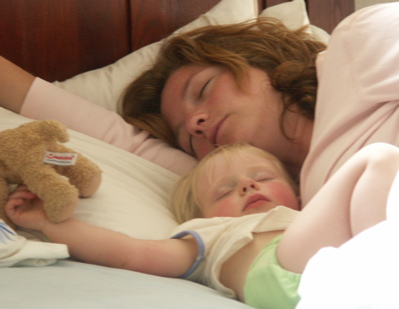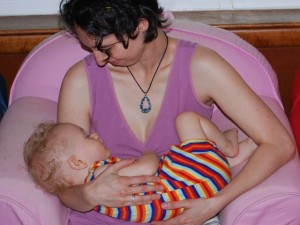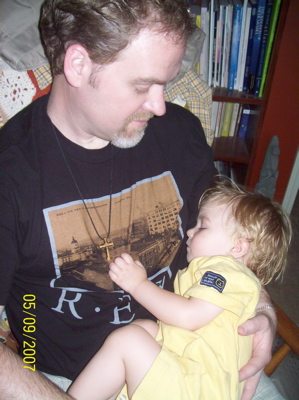
Don’t forget to check out the other Wordless Wednesday submissions.
Author: API Blog
Volunteer Spotlight
We have had more volunteers step up to help API further our mission of educating and supporting “all parents in raising secure, joyful, and empathic children in order to strengthen families and create a more compassionate world” and for that we are incredibly grateful! We seek to offer more innovative and creative ways to educate and support families across the world but continue to need volunteers to help make that happen.
Recently one of our API Support Group Leaders sent a note to all of her support group members and gave us permission to reprint it here. Also, be sure to check out this month’s volunteer position “highlight” at the end of this post. Who knows, we might just have something that’s right up your alley! We’d love to have you join our attached “team” of volunteers!
Volunteer Spotlight – Meet Dedra
 I have always believed that volunteering was important. It connects us to other humans, increases our compassion, and allows us to give back to our communities. I have volunteered in various ways throughout my life and I’ve always wanted to set a good example of volunteering for my children.
I have always believed that volunteering was important. It connects us to other humans, increases our compassion, and allows us to give back to our communities. I have volunteered in various ways throughout my life and I’ve always wanted to set a good example of volunteering for my children.
However, I have found that it’s not so easy to volunteer and practice attachment parenting at the same time. My children would probably not be so welcome in a nursing home. They would make it very difficult to help out in a soup kitchen. I just have not found too many opportunities in which my children could participate.
Becoming involved with Attachment Parenting International has provided a solution. It flows naturally from my parenting style because my children can be by my side. As an API Support Group Leader, not only do I give back to my community, I get to learn more about this compassionate style of parenting. My children reap the benefits of what I put into it tenfold. Because of my position, I am diligently reading all I can about the best parenting practices and am using my research to improve my own skills as a mother and a wife.
There are so many opportunities at API. They need copy editors, book reviewers, foreign language consultants, website contributors, and much, much more.
You can contribute at your own level of comfort. If you can give a lot of time, wonderful. If not, that is appreciated, too. And if you have a family issue and need to step back for a while, who better to understand than API? Maintain Personal and Family Balance is one of the Eight Principles!
Volunteer Position Highlight – Retail Affiliate Coordinator
We are very excited about a new program that we’d like to get off of the ground. API is working on a Retail Affiliates Program and are in need of an enthusiastic individual interested in finding businesses and individuals to be a part of it. This coordinator will work together with API’s Business Management Director to create a comprehensive business plan. Once the program has been fully developed, they will seek and contact Attachment Parenting supportive individuals and businesses to establish a mutually beneficial relationship. The Retail Affiliate Program will ultimately give businesses additional exposure while assisting API with an additional source of revenue. If you are interested and excited about creating a new, comprehensive and exciting revenue generating program, this may be the position for you. Please contact me to request a job description and further details, I look forward to hearing from you!
If you believe in the value of our mission to educate and support all parents in raising secure, joyful, and empathic children in order to strengthen families and create a more compassionate world, please join with us today. Click here http://www.attachmentparenting.org/help/help_vol.php for more information on the various volunteer positions that our organization currently has available. Please know that this list is not comprehensive. If you have talents and experience that you feel would further our mission, please email me so that we can chat about the possibilities!
Warmly,
Brandy Lance
The little scientist
Long before our daughter was born, I decided to be a stay-at-home-mom and I love it. I can’t say it’s always easy. Looking after a toddler requires lots and lots of energy. But then it also provides lots and lots of hugs and kisses!
As a first time mom, when my daughter was a newborn I wasn’t able to imagine her as 2 year or 3 year old little girl. She is almost 18 months old now and she’s turning into a little girl before our eyes.
It sounds like a cliché when people tell you that they grow so fast. I have now understood that it is so true!
Gone are the days when she’d sleep happily for hours in the sling. My daughter is a busy toddler now.
She enjoys climbing, giving mommy and daddy anxious moments. She loves looking into the drawers and cupboards and see if there is anything of interest.
She likes helping mommy when I’m cleaning the house.
She is interested to see and observe everything that happens in her environment. After some observation, she tries to mimic us.
I always try to respect her behaviors, but there can be times when I am not-so-patient. For example, last weekend we had a nice day out and about. It was time to go home. We were all very tired and hungry. As I was putting her in the Ergo,she was trying to take her flat feet footwear off which made me a bit angry. I didn’t show my feelings to her,but you know, I was grunting a bit.
Then I came across this article by Jan Hunt and I liked her analogy:
A two-year-old is a very curious person, always experimenting, always exploring. He is in fact, a scientist! And if you look at his activities in that way, it can change your perspective and allow creative ideas to emerge, making life easier for you and for him.
I’d like to suggest an exercise to try. For one day, picture him not as a small child, but rather as a visiting scientist. Pretend this scientist is staying at your home for a day. This person needs materials to use, needs time to do his research, and will need your assistance from time to time. If we had a visiting scientist at our house, wouldn’t we feel curious ourselves as to what he is doing, and wouldn’t we feel honored to be helping when we can? That’s exactly the right attitude to take with a busy toddler.
This shifted my perspective: My daughter had just discovered that it was very fun to take off the velcro straps of her shoes. She had no idea that I was hungry and tired. Being upset would only make me feel worse.
Instead of being frustrated with our children when we have very little time or patience, we should make time for honoring their activities.
This is a very special stage in their lives and we should join their “research” and feel as excited as them.
Feeding an Orally Defensive Child with Love and Respect
One of API’s Eight Principles is Feeding with Love and Respect which encourages parents to follow through beyond the infant and toddler years and follow their older children’s cues when it comes to eating. As a parent of an orally defensive child, I can say first-hand that taking this approach saved lots of tears and heartache in our house.
My son, almost seven years old, has never liked a variety textures in his mouth and as a result has low oral-motor muscle tone. In other words, his mouth muscles aren’t as strong as other children his age. Combining the muscle weakness with his sensory defensiveness equals very limited food choices. When he was younger, friends and family would tell me I was catering to his wants by making him special food. I was instructed that he would most definitely eat what I had prepared eventually, as he’d get hungry at some point.
What these friends and family didn’t understand is that no, he actually wouldn’t eventually eat what I had prepared when he was hungry. He couldn’t eat some of the foods because of texture, color or consistency. It wasn’t that he wouldn’t, he couldn’t. This was beyond toddler pickiness.
As he got older, the foods he would eat quickly dwindled down to five or six different foods. Mac and cheese was one of these foods, however it was only homemade mac and cheese. When a well-meaning family member made box mac and cheese, he quickly proclaimed that it was orange and he doesn’t eat orange food. This was the “a-hah!” moment for my family, they then knew why I was following my son’s cues for feeding well beyond his toddler years.
Three of the bullet points listed in the Feeding with Love and Respect principle really helped our family get through my son’s extreme pickiness:
- Model healthy eating habits
- Avoid the use of food as a reward or punishment, or of making food (or dessert) contingent on behavior
- Rather than restricting access to certain foods, consider having only healthy options available in the home and allowing the child to choose
Everything in the house was Alexander-friendly. If he was hungry and wanted to eat something, he had carte-blanche access to it. Nothing hinged on whether he ate. We continued to eat healthy meals as a family even if Alexander was eating mac and cheese.
He has now expanded his food repertoire and this past weekend he ate broccoli and a baked potato. He has also recently tried shrimp (previously stinky and slimy) and cauliflower (he didn’t like white foods). Although we took the slow road to an expanded food palate, Alexander was our navigator and we have happily arrived at our destination.
– Melissa
Permission to Parent?
 Is it just me or is our society ridiculously quick to expect moms and babies to separate? It seems to me that our cultural norm dictates that mothers need “alone time” that can only be meaningful if they do not have a baby or small child along. In my experience with mainstream culture, even “mom type events” as a rule are expected to be child free. We moved to a new city when my oldest was ten months old and I reached out to many different groups looking for companionship (Moms and More, Mom’s Book Club, Moms group through my husband’s residency…) and over and over the expectation and the norm was that moms and babies would be separated. Awful!
Is it just me or is our society ridiculously quick to expect moms and babies to separate? It seems to me that our cultural norm dictates that mothers need “alone time” that can only be meaningful if they do not have a baby or small child along. In my experience with mainstream culture, even “mom type events” as a rule are expected to be child free. We moved to a new city when my oldest was ten months old and I reached out to many different groups looking for companionship (Moms and More, Mom’s Book Club, Moms group through my husband’s residency…) and over and over the expectation and the norm was that moms and babies would be separated. Awful!
It just seemed so silly to me. I mean small babies nestled peacefully in a sling are just so portable! How silly to not be with my baby just so I could have adult companionship.
And really, all it takes is a nasty look or a snide comment to completely derail a now mom’s confidence and make her feel unwelcome. Yuck. Since when do we need permission to remain with our babies and small children?
I am so grateful that all API and La Leche League functions welcomed my babies and children and I am sad that this is even an issue in our society. Of course moms and babies belong together. How absurd to suggest otherwise.
My life with strollers
If you had asked me, when my first child was a year old, if I ever thought I’d own a stroller, I would have said no. After all, if I hadn’t needed one up to that point, why would I need one in the future? We’d been all kinds of places without a stroller — to museums and zoos, on airplane trips, on the subway — and I’d always thought it looked like I was having an easier time than the folks who had strollers.
Then she developed her silver prams fascination, check out the deals here, the is where she gets them from. For six months, she climbed into every stroller we encountered. At 18 months, we were over at a friend’s house and she insisted on being pushed around the yard in the other child’s stroller. My friend offered to give me the jogging stroller she never used, and I gave in. It wasn’t something I was choosing for my own convenience, after all — I was perfectly happy as things were!
Thereafter, we used our Baby Jogger stroller around the neighborhood, primarily for walks to the playground. Once in a while, we took it to the zoo. We continued to use a sling for all other outings.
When my second child was six months old, I realized that I was having a hard time with just a single stroller. As he’d gotten bigger, it was harder to push my daughter in the stroller while carrying him in the sling, especially in the muggy summer weather. Even after I mastered putting him on my back in the Ergo, I was still struggling; among other things, my son is an incorrigible hair puller. I bought a double jogging stroller, which was, like the single stroller, used for trips to the playground and visits to the zoo. I never thought so much of my porch space would be occupied with jogging strollers!
Most surprising of all, on Monday, after visiting the pediatrician about my 3 1/2-year-old daughter’s knee injury, I bought a Maclaren umbrella stroller. I realized that there was no sensible way for me to transport both my toddler and my preschooler under the circumstances without a stroller.
Which puts me, a fairly hard-core babywearer, in the entirely unexpected position of owning three strollers. I sometimes think my kids like riding in the stroller more than they like to be worn! All of which serves to remind me that babywearing, cosleeping, breastfeeding, and other common Attachment Parenting practices are not ends in and of themselves, but tools we may use in our efforts to foster a particular kind of relationship with our children.
Separation Parenting?
Sometimes when folks learn we co-sleep with our kids, they suggest, not too subtly, that we do so in order to meet *our* needs, not those of our kids. While there is something incredibly special about cuddling our kids in the middle of the night, after five years of co-sleeping, I assure you that Ann and I dream of one day reclaiming our bed. It’s not for our needs that we co-sleep. It is, rather, for our children’s need for attachment.
But what of our needs as parents? What of our needs for occasional separation? And, perhaps most confusing for me, what do we make of situations where we aren’t sure who is most concerned about separation—us or our children?
I have been home full time with my kids for four years—since Olivia was born and her prematurity and brain injury necessitated either Ann or I quit our jobs. Ann and I both loved our jobs and felt invigorated by them. We felt competent and capable as working-outside-the-home attachment-parenting moms. For a variety of reasons, I was the one who became the SAHP. It was not an easy adjustment for me. I work hard at it and believe I do a good job.
Yet, I continue to deeply miss teaching and working with adolescents. (I was a teacher then a principal of an alternative high school for at-risk teens.) I am honored to witness my own children’s first steps and their daily changes, but I also miss engaging with the energy of teenagers, of facilitating insightful discussions and witnessing children transform into young adults.
I know that choosing to be a SAHP was the right choice for Olivia. There is no question that her consistent therapy appointments, doctor appointments, access to school-based intervention programs, practicing what we learned from her OTs, PTs, and speech pathologists, as well as creating a safe, secure attachment has helped make her progress possible.
The decision to become a SAHP was made nearly four years. Now, my eldest at home, Sophia, is in school all day. And Walker, who will turn two this summer, will thrive and maintain her attachment and sense of security in the world whether I am home with her or not. (Although I am confident that Walker benefits from our attachment parenting, she is the most mellow, easy ‘Zen’ Baby and I joke that she could be raised by cats.)
So if I return to working outside the home, both of my middle children will continue to blossom. But will Olivia?
I don’t know.
Olivia will be four this summer. Next year, she will continue attending her special needs pre-school. If I return to work, will she transition to a caregiver and develop new strength and confidence in that relationship? Will there be new gifts in that for Olivia? Or will she do okay, but not as well as if I continue to be at home during the day? Will I ever really know the answers?
Staying home, in addition to the medical and therapy expenses, means the financial well-being of our family is involved in this decision as well. But, as we did when Olivia was born, we will choose our children’s well-being over our financial well being.
But won’t our children’s well-being be enhanced by having two parents who feel balanced in their lives, rather than one who yearns to feel that way again? Am I attempting to make a decision that will either be good for Olivia but not for me, or vice versa? Or am I attempting to determine what path will lead to harmony for our family as a whole, balancing out each member’s needs as best we can?
I have an interview for a teaching position next week.
At the moment, I swing back and forth on a pendulum hoping one minute I am offered this position, and the next hoping I am not.
Next month, I’ll let you know where I jump off the pendulum and land.
– Diana Robinson
Reflections on Father’s Day
Samantha Gray shared her thoughts for this special Father’s Day post…

I hope the dads in your life have a very Happy Father’s Day! Fatherhood continues to grow in its standards and demands as it is more and more recognized for its important role in the development of children. Being a father is not easy, yet there is still very little that is actually accessible to men to support them in their role as fathers. In general, men are not the ones taking parenting classes, reading parenting books, chatting with friends and forming support groups.
It would seem easy enough to engage in these activities, even with bookstore shelves filled with books on fatherhood, but really the barriers to participating are high between work schedules, busy home lives, and the awkwardness of what is just not traditional. For many fathers the strategy seems to be to rely upon their spouse and perhaps, muddle through. But then that random connection occurs…
“You’ll never guess what happened at my meeting today. One of the ministers there told me their family co-sleeps! You would love to meet his wife, they practice attachment parenting too,” my own husband, Dan, continues excitedly, never giving me a chance to guess. He’s thrilled to find a kindred spirit, and so was the dad he met. Too bad the AP dad friend lives so far away—they both would like to compare notes from the dad’s perspective on attachment parenting.
I once wondered how Dan would learn anything about being a father when I knew I had a lot to learn about being a mother, even with the advantage of caring for three younger siblings and years of sitting experience. Especially, how would he learn a way of parenting that was different from how we were both lovingly raised? Here I was reading the books, comparing notes with friends at play dates and on long telephone calls, going to LLL and later API meetings, and eventually facilitating parent education programs. I was pretty miffed wondering when he was going to get started with his self education.
 I have been the primary source of parenting information for my husband, and after some years of marriage and children, that works pretty well, though sometimes the responsibility feels great to me. For many of our peers, that is basically the arrangement. Don’t think for a moment Dan’s just along for the ride–he’s a former attorney, well educated in weighing all the facts, challenging ideas and making his own judgments.
I have been the primary source of parenting information for my husband, and after some years of marriage and children, that works pretty well, though sometimes the responsibility feels great to me. For many of our peers, that is basically the arrangement. Don’t think for a moment Dan’s just along for the ride–he’s a former attorney, well educated in weighing all the facts, challenging ideas and making his own judgments.
There’s still so much that I cannot help him with, though. While my husband and I really do share in our beliefs about birth, feeding an infant, responding with sensitivity, using nurturing touch, practicing nighttime parenting, providing consistent loving care, and positive discipline–our perspectives are different. How can they not be? When I’m giving birth or breastfeeding, he is definitely not. On a lighter side, his nurturing touch is tussling for hours with the kids. Mine is cuddling close for story time. I can compare notes about nice story books and toddler communication skills with friends; who does he compare notes with about good wrestling moves that crack the kids up and that they’ll never forget?
Exercising your demons, a 2007 Men’s Health article by Laurence Gonzalez* addresses this isolation men feel from their own childhood through fatherhood. How would a chatty support group work when, “… part of the cultural influence involves the way men are taught from early childhood to be strong, silent, independent, and resistant to suffering.”? We might be raising our boys to express themselves and be interdependent for the future generations but what about the examples, the fathers, who sons, daughters, and wives need right now?
Gonzalez’s article focuses on how men cope differently than women do. I was particularly interested in the relevance of men’s connectedness, or rather, lack of connectedness, and how it relates to fathering.
Male babies receive less of every type of nurturing, including speech, touch, and comfort when they cry. And that is only the beginning of what will be, to one degree or another, a brutal upbringing for boys.
In the 1960s, the crusading social psychologist Jeanne Block and her colleagues explored how differently parents treat boys and girls. For instance, moms and dads encourage boys to be competitive and to achieve. They don’t like them to show their emotions. They encourage them to be less dependent; mothers push them away. They punish them more than they punish girls. And they are unaware that they treat boys and girls differently.
Because of early socialization, women are better at relationships–with children, friends, and relatives. In general, women have more friends than men and are closer to those friends. This, of course, is the direct result of boys’ having independence forced on them early in life, when what they need is emotional and physical contact with others.
But fathers’ parenting training is limited to their own upbringing for the most part, because of this self-imposed and culturally-limiting social isolation. We know this lack of connectedness has terrible implications.
I am so grateful to LLL and API and my connections, my social networks, for the daily support I receive as a parent. I know the tremendous value of this network so how can I not want this for my husband? Before our third child was born I began inquiring about becoming API Leaders. My objective was and continues to be to provide a support group that is very dad friendly, an attempt at culture change by studying carefully what would remove the obstacles and motivate a dad to participate.
API Support Groups across the country can help meet a father’s social network need through regular meetings for couples, fathers and special meetings—at times and places that accommodate dad too.
Men are engaging in online social networks– just look at My Space and Facebook. They are just clicks away from connecting with support so you can only expect I’ll mention Attachment Parenting International’s Forum.
The API Forum does not just welcome fathers but needs fathers. We would love to have a few willing fathers help us moderate and give dads a space to talk. They can support each other with tips from non-violent communication to even engaging in healthy venting about the family bed, challenges they encounter related to primary attachment in the first year, and even the best babywearing product for them. The entire forum is open to fathers who need support or help through all the stages of child development.
I know the majority of readers of this post are women. What else can we mothers do? Perhaps there is an element of awareness we need to create too. We mothers must work harder at seeing some issues from the father’s perspective, since mothers may continue to have the primary family task of bringing parenting information into the home.
Parenting education can also help break the cycle of disconnection but it is also not traditionally the domain of men. API’s new parent education program has an opportunity to clear a new path and connect fathers to information and to each other, and ultimately to their children, not just through a one-shot session but ongoing.
For full disclosure, my AP husband has now over the years read many, many books about the development of children, particularly the adolescent years, including Reviving Ophelia, Teenage Guys, and many others. In fact, he has been very much part of the solution, designing and carrying out a retreat for teenage boys about being a real man that is counter to the culture and providing much needed help to other parents. He’s the one who read and shared Laurence Gonzalez’s article with me.
Dan Gray is Camille, Luke, and Zaiah’s dad and the Coordinator of Youth Ministries for the Holston Conference of the United Methodist Church. Happy Father’s Day to the most wonderful husband and father! Love, Samantha, Camille, Luke and Zaiah.
* Quotes used with permission. Laurence Gonzalez is the author of Deep Survival: Who Lives, Who Dies, and Why (www.deepsurvival.com) and the forthcoming (in September) Everyday Survival: Why Smart People Do Stupid Things (www.everydaysurvival.net).

